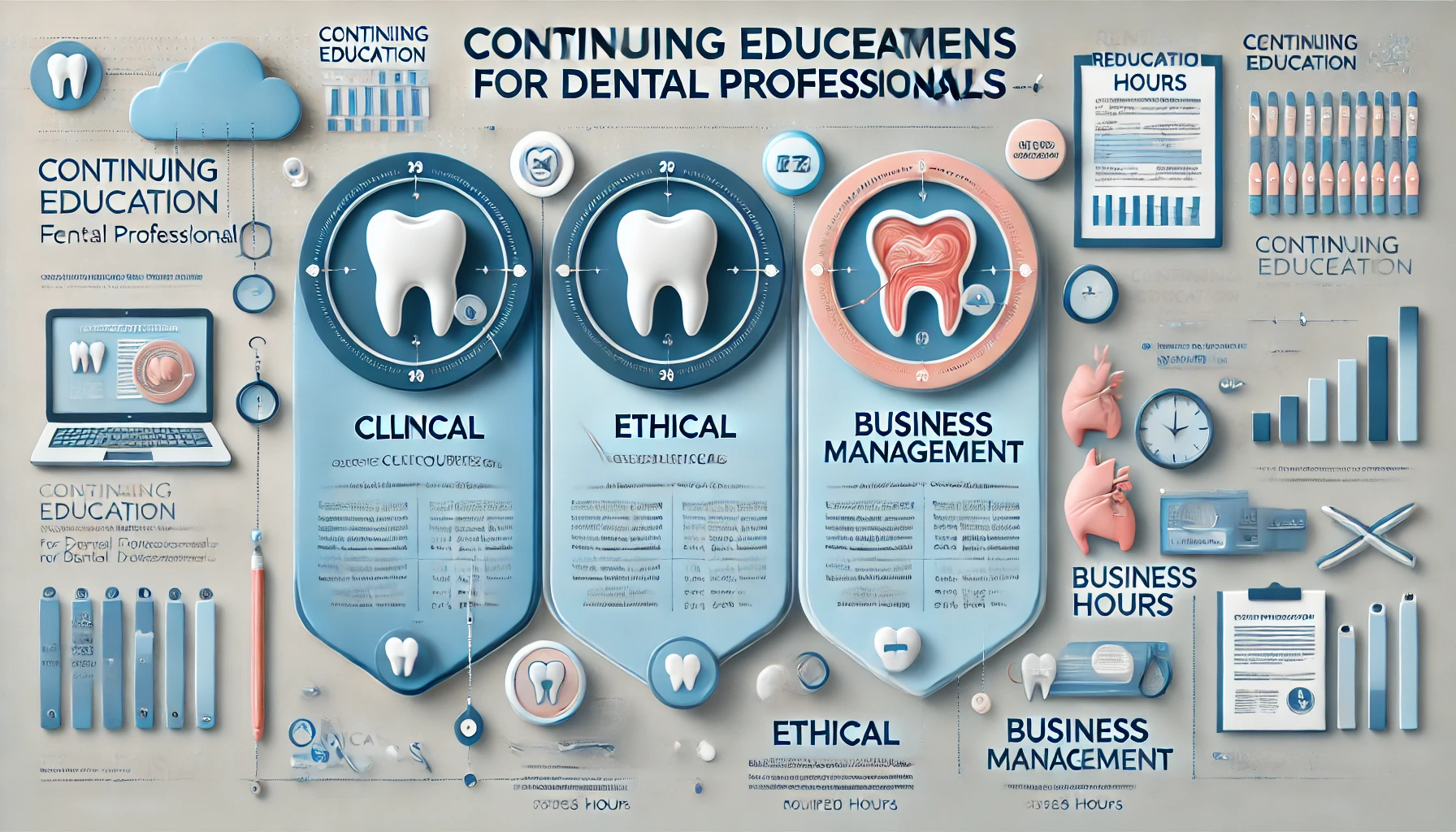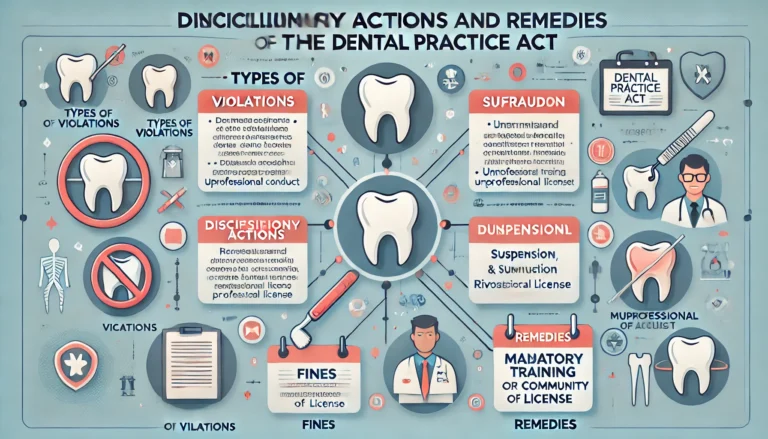Continuing Education Requirements for Dental Professionals
As a dental professional, staying current with the latest advancements, technologies, and best practices in the field is crucial. This is where continuing education (CE) comes into play. Continuing education requirements for dental professionals ensure that we maintain the highest standards of care and are well-equipped to address the evolving needs of our patients. In this blog post, we’ll explore the significance of continuing education, what it entails, and provide practical tips to help you meet these requirements effectively.
Why Continuing Education is Essential
Continuing education is not just a regulatory requirement; it’s a cornerstone of professional development. It ensures that dental professionals:
- Stay updated with the latest scientific research and technological advancements.
- Enhance their clinical skills and knowledge.
- Improve patient care and treatment outcomes.
- Maintain licensure and comply with state regulations.
The dental field is dynamic, with new discoveries and innovations emerging regularly. CE courses cover a broad range of topics, including diagnostic techniques, treatment methodologies, patient management, and ethical practices. By engaging in continuing education, dental professionals can provide the highest quality care and maintain their professional integrity.
Understanding Continuing Education Requirements
Continuing education requirements can vary significantly depending on your location and specific dental profession, whether you are a dentist, dental hygienist, or dental assistant. Here are some general guidelines to help you navigate these requirements:
General Requirements
- State-Specific Mandates: Each state in the U.S. has its own set of continuing education requirements. It’s essential to check with your state’s dental board to understand the specific mandates, including the number of required CE credits and the types of courses that qualify.
- License Renewal Cycles: CE requirements are typically tied to the license renewal cycle, which can range from one to three years. Ensure you complete the necessary credits within the specified timeframe to avoid any disruptions in your licensure.
- Approved Providers: Not all CE courses are created equal. Many states require that courses be taken from approved providers, such as accredited dental schools, professional dental associations, or recognized CE organizations.
Specific Course Topics
While general CE credits can cover a broad range of topics, some states may mandate specific courses in areas such as:
- Infection Control: Ensuring compliance with the latest standards and protocols.
- Ethics and Jurisprudence: Understanding legal and ethical obligations in dental practice.
- Pain Management: Techniques and best practices for managing patient pain effectively.
- CPR Certification: Maintaining up-to-date CPR skills for patient safety.
Tips for Fulfilling Continuing Education Requirements
Meeting continuing education requirements can be a straightforward process with the right approach. Here are some practical tips to help you stay on track:
Plan Ahead
Procrastination can lead to stress and potential licensure issues. Create a plan that outlines your CE goals for the year and stick to it. Keep a calendar of upcoming courses and deadlines to ensure you complete your credits on time.
Choose Relevant Courses
Select CE courses that align with your professional interests and areas where you feel you need improvement. This not only makes the learning process more enjoyable but also ensures that you gain valuable knowledge and skills that you can apply in your practice.
Utilize Online Resources
Many accredited organizations offer online CE courses, webinars, and virtual conferences. These can be a convenient way to earn credits without the need to travel. Online courses often provide flexibility, allowing you to learn at your own pace and schedule.
Attend Professional Conferences
Professional dental conferences are excellent opportunities to fulfill CE requirements while networking with peers and industry experts. Conferences often offer a variety of courses, workshops, and hands-on training sessions.
Keep Records
Maintain accurate records of your completed CE courses, including certificates of completion. This documentation is crucial in case of an audit by your state dental board. Many states require dental professionals to submit proof of CE credits during the license renewal process.
The Importance of Continuing Education for Dental Professionals
When it comes to providing exceptional dental care, continuing education for dental professionals plays a pivotal role. By engaging in ongoing learning, dental practitioners stay abreast of the latest advancements in dental science and technology. This not only enhances their clinical skills but also ensures compliance with state regulations and licensure requirements.
Investing in continuing education demonstrates a commitment to professional growth and patient care, ultimately leading to improved treatment outcomes and higher patient satisfaction. For dental professionals seeking to maintain a competitive edge in their field, prioritizing continuing education is essential.
Examples and Real-Life Scenarios
To illustrate the impact of continuing education, let’s look at a few real-life scenarios:
- Adopting New Technologies: Dr. Smith, a general dentist, completed a CE course on digital radiography. This new knowledge enabled him to implement digital x-rays in his practice, improving diagnostic accuracy and reducing patient exposure to radiation.
- Enhancing Clinical Skills: Sarah, a dental hygienist, took a CE course on advanced periodontal therapy. She gained expertise in scaling and root planing techniques, leading to better patient outcomes in managing periodontal disease.
- Staying Compliant: John, a dental assistant, attended a mandatory infection control course. By staying updated on the latest protocols, he ensured his practice adhered to OSHA standards, maintaining a safe environment for both patients and staff.
Informative List: Key Benefits of Continuing Education
- Improved Patient Care: Staying current with the latest research and techniques leads to better diagnosis and treatment outcomes.
- Professional Growth: Continuing education fosters personal and professional development, enhancing your skills and knowledge.
- Compliance: Meeting CE requirements ensures compliance with state regulations and helps maintain your professional license.
- Networking Opportunities: Attending CE courses and conferences provides opportunities to connect with peers and industry leaders.
- Career Advancement: Gaining new skills and knowledge can open doors to advanced roles and specializations within the dental field.
Conclusion
Continuing education is an integral part of a dental professional’s career. It not only helps you stay updated with the latest advancements in the field but also ensures compliance with regulatory requirements and enhances your ability to provide high-quality patient care. By planning ahead, choosing relevant courses, and utilizing available resources, you can meet your CE requirements effectively and continue to grow as a dental professional.
Remember, continuing education is not just a requirement—it’s an opportunity to excel in your profession and make a meaningful impact on your patients’ lives.



